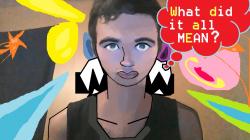Silver Voice
Folder:
The Odyssey She looked at the flute on her piano and thought, It has been many years since I first learned to play it.
The silver caught the light just so, in that way that finely crafted trinkets do, ethereal and unreal; she was taken by the whimsical thought that it was made of light, that the silver glistering buttons and levers were not a mere reflection but an emanating glow which escaped when it was activated.
Tolkien, she thought, reaching for it. She lifted it off the stand and her hands automatically took it in the proper form; she had first played when she was a girl of twelve and now almost twenty years of experience manifested in the flutist's well-practiced form.
It was not something she would notice unless she thought too hard about it, but her fingers curled delicately over the silver and the shine sparkled under her fingertips and those who saw her do it would become quiet and wait; there is something subtly enticing about a well-practiced hand lifting an instrument that asks, not demands, the attention of potential listeners. But as the voice of a beautiful woman turns a room, so do a musician’s practiced hands.
Tolkien, she thought, readying it. Galadriel said, “Frodo Baggins, I give you the Light of Eärendil, our most beloved star. May it be a light for you in dark places, when all other lights go out.”
So she called her flute (privately, she never shared its name with another soul) Eärendil, because it was the most beloved of her stars.
She wetted her mouth unconsciously and slipped the mouthpiece under her lower lip and rolled the silver back and forth.
Embouchure, it was called, the way one held their mouth to make sound. A word bespoke to musicality.
She exhaled through her nose, and took another deep breath (Shoulders! Don’t move your shoulders!) and began to play.
The first note was sour.
She laughed and tugged the tube of the mouthpiece: it was three parts, the mouthpiece, the body, and the foot. The mouthpiece was to be slid in and out to tune it.
She readied her hands again, licked her lips, and closed her eyes.
Instinct again; seeing often got in the way of hearing.
And she played.
The song lived in memory, sung through the silver: a song, first, of a green forest enchanted, and filled with creatures of legend and myth.
Light, breathy notes created the little creatures who darted between tall trees, low ringing notes created the stag who suddenly stood tall, watching for whatever caused the crack of the twig just nearby.
The forest itself came to be in the silence between notes, implied through gestures, hidden between notes and trills; the sound of music was as silver as the flute itself.
Memory is that most elusive and wondrous thing which may tell lies and make them seem truth. Fiction it is, but wordless music hides fiction best. Much like plays that do not disguise the artifice of their props, so wordless music does not hide its falseness and in its paradoxical openness invites, entices the listener to think not of the flutist, the flute, or the notes of her song, but to experience whatever world she called with her silver voice.
She played, but it was not to escape to that world; she thought of the notes, the tempo, the boring mundanity of performance, but she practiced, practiced, practiced so that others would go to the world she sang of.
It is not true, however, that she could not glimpse into the world she created; it is different to play music versus experience, but in the way of passing through the woods in a car, flashes of images slipped between the technicals.
She finished the song and, holding the flute in one hand, rifled through the piano bench for some sheet music.
Yes, upon finding it, yes, she found the work she wanted to play.
It is, of course, the paradox of music, work to play, play is work, fiction and truth and clarity in deception.
The flute’s silver voice rang through her small apartment. The flute’s silver voice was her own, in a way that her foolish throat could never hope to be.
I love music, she thought idly, and the flute sang.

This is provides excellent
This is provides excellent reading, but those last three paragraphs are very, very profound. I am not usually a prose reader, but I am very impressed with this one.
Starward*Led